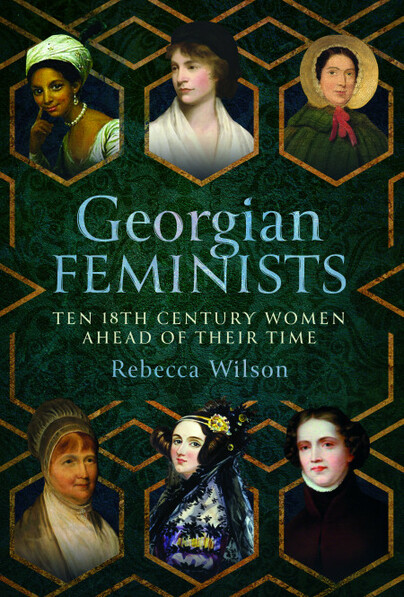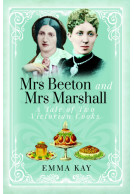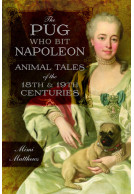Georgian Feminists (Hardback)
Ten 18th Century Women Ahead of their Time
Imprint: Pen & Sword History
Pages: 268
ISBN: 9781399069250
Published: 4th March 2025
(click here for international delivery rates)
Order within the next 1 hour, 56 minutes to get your order processed the next working day!
Need a currency converter? Check XE.com for live rates
| Other formats available | Price |
|---|---|
| Georgian Feminists ePub (3.4 MB) Add to Basket | £14.99 |
For centuries women’s history has been dismissed, or ignored entirely. Women make up half of society, and yet few pages have been written about women’s history, their lives, and contributions. It is time to redress this imbalance and recognize the significant involvement and impact women have had throughout history.
Enter the Georgian period, hailed as the Age of Enlightenment. Amidst a backdrop of cultural blossoming, intellectual fervour, and the whirlwind of the Industrial Revolution, society underwent seismic shifts politically, socially, and technologically. However, for women, the landscape remained largely unchanged; the expectations of domesticity, marriage, and motherhood persisted as steadfast norms.
Embarking on a journey through diverse backgrounds, from aristocracy to enslavement, this book introduces ten remarkable women who defied societal norms during the Georgian period. Among them are political activists, social reformers, a literary luminary, a pioneer in palaeontology, and a mathematical prodigy. These trailblazers dared to pursue careers, passions, and lifestyles deemed scandalous by societal standards, challenging the status quo and carving out paths of empowerment in a world reluctant to grant them their due recognition. Each embodies the spirit of feminism, resisting the grip of patriarchy and leaving an indelible mark on history.
Rating: 5 out of 5 stars
NetGalley, Rebecca Wild
Another excellent book from Pen & Sword History. I’ve read a lot from them lately but all have been around the Tudor period so this was a nice change. I love reading about women who were empowered and were not quite what society expected at the time. It’s women like the ones in this book that laid the way for female empowerment for the women of today!!
Rating: 5 out of 5 stars
NetGalley, Rebecca Stewart
I can understand why some people might have a hard time understanding why some of the people in this book might be considered feminists. However, those people are looking at it from a modern perspective. Simply by being a female writer, Jane Austen was breaking out of gender norms. She didn't even publish under her name at first, the idea was so outrageous to society. We need to remember that every right women have wasn't just freely given. It was fought for by feminists.
I really enjoyed this book and look forward to reading more books by this author in the future.
Rating: 5 out of 5 stars
NetGalley, Juliane Silver
This is a look at 10 women, from the Georgian period in Britain, their lives and and accomplishments. The writer calls feminists: women who challenged the status quo and carved out paths of empowerment. They come the aristocracy, the well-to-do and from the working class. Some are more well-known than others such as Mary Wollstonecraft and Jane Austen. Others are not so well known as Mary Fildes, Peterloo survivor and political activist and Elizabeth Fry, prison reformer.
The introduction includes general information about the period, particularly about details about women's education, marriage, pregnancy, religion and even dress that I found interesting. The practice of pregnant women being shut in hots rooms with no ventilation, lying in bed, and limited amounts to eat sounds barbaric. Then the unsanitary conditions that they endured during and right after birth along with again limited amounts of food makes it a wonder than women survived the whole process at all. I liked that there was a variety of people from different social strata and in different areas of activism included...
Overall, an interesting book that gives information about women who bucked the system and took the world on in their own ways.
Georgian Feminists is an accessible and thought-provoking introduction to ten intriguing strong women from the Georgian Era. The women are from different classes, different backgrounds and led very different lives. Some of these women I already knew, but I still loved the author's research and thoughts about them. Others were new to me, and I am glad to have learned about them for the first time.
NetGalley, Mona M
The book is clearly well-researched and is approached with respect, passion and open mind. The author doesn't put the ladies in question on a pedestal. Instead, we are introduced to their flaws in addition to their achievements as well as introduces the reader to societal and cultural norms and influences that could have left a mark on each of the women, ultimately leading to their actions.
I enjoyed reading the speculations from the author as much as learning the facts about those women. It almost felt as if I were having a conversation with the author.
Rating: 5 out of 5 stars
NetGalley, Anita Wallas
Absolutely brilliant. Rebecca Wilson has done an amazing job of selecting a diverse range of ladies from the Georgian era and giving them full credit for their achievements. Over centuries, the role of women in society is under valued and mis represented, The time to redress the balance is long overdue and books like this help to inform a wider audience if the Rome if women. I knew of most, but found their stories well fleshed and riveting. Lovelace is never credited with her genius. Mary Anning was astonishing in her contribution to the geological world, but was and is trivialised. She was not only female, she was poor. Lister’s life beggars belief. What a spirit! Galavanting across Europe to climb in the Alps dressed in shoes and an overcoat. Misguided, maybe but a visionary and a singular individual. Every one of these ladies has a story to tell. They’re part of the rich fabric of history and it’s right that much of the tapestry is being revisited and refreshed by authors who can redress the balance so well. Rebecca Wilson does a great job of setting the context, with a look at Georgian life. It’s an amazing read and one of interest to anyone who enjoys social history or even people watching. I loved this book.
Rating: 5 out of 5 stars
NetGalley, Mindy Bartlett
This is a very impressive collection of women from the Georgian time period. The author has a well rounded list. She first described the living conditions of women at the beginning of the book. I'll admit, some of it was hard to read, particularly childbirth. It makes me grateful for modern medicine. From there, she lists important women: some rich, some poor and blends the already famous with the lesser well known.
Sarah Pennington
Mary Wollstonecraft
Dido Elizabeth Belle
Jane Austen
Hester Stanhope
Elizabeth Fry
Mary Fildes
Anne Lister
Mary Anning
Ada Lovelace
It's obvious the author has done extensive research, since there are quite a lot of footnotes. This is great book. I learned a lot about many women I had never heard of, before. I'm also interested in the author's book on Tudor women.
Rating: 5 out of 5 stars
NetGalley, Georgi Lvs Books
‘For the most part, the role of a woman remained much as it had done for centuries. Girls were brought up with the sole purpose of finding a husband, ideally one of good standing and with money.’
I adore Rebecca’s work. This was such a fascinating read and my love for Georgian history has just grown so much more after reading this.
Every woman was inspiring to read about.
A must read for anyone who enjoys history and woman’s history.
‘Her strength to leave that marriage and her determination to contact her children made her stand out from the many married mothers in this country. She went to such lengths to make her children feel loved.’
Rebecca has also written Tudor Feminists and her next book is Victorian Feminists which isn’t released until 2026 but I am EXCITED!!!!
The introduction to Georgian Feminists is an impressive weaving together of the underlying philosophy and social context which impacted the individual lives of the ten women who feature in this book. Rebecca Wilson has adopted an accessible style without neglecting a scholarly approach to ensuring that the women’s stories are seen as the outcome of the ideological foundations impacting the period. Wilson frames the women’s lives and their rebellion in the society that depicted them as inferior, worthy of little respect or economic independence and the chattels on whom men might rely, but unworthy of credit or even acknowledgement. She returns to this approach throughout the book, making it a worthy intellectual endeavour as well as promoting easily absorbed information.
NetGalley, Robin Joyce
The ten women, some well-known, others about whom little has been recorded are well chosen. Sarah Pennington is followed by more familiar figures such as Mary Wollstonecraft, Jane Austen, Elizabeth Fry and Ada Lovelace. Dido Elizabeth Belle, Hester Stanhope, Mary Fildes, Ann Lister, and Mary Anning round out the group so that the themes that might be familiar from other authorities and Wilson’s work on familiar characters can be applied readily to new stories and actors.
Wilson raises new viewpoints about known women, for example, she questions the way in which Austen’s work has usually been considered. Importantly, she brings to her accessible work the understandings found in heavier academic texts where feminist re-readings have raised new ideas about Austen’s approach to women’s position, particularly as it relates to marriage. This approach brings a freshness to stories considered known, making such a valuable contribution to women’s history. At the same time, the introduction of less well-known women’s history rounds out the book.
Demonstrating her independent approach to women’s role throughout history, Wilson begins by acknowledging that some women have always been independent of the social mores that determined their existence. This is a well-considered beginning, accepting as it does, that no century has been without its women of note, and fortunately some of their activity has been recorded. Not enough about particular women, and not about enough women in general, it is true. However, Wilson’s support for recognising that women’s independent thought and activity is not confined to ‘waves’ as some writers suggest provides an important foundation to her work. Some women have always moved beyond the confines of their sex, and Wilson is introducing some, adding more information to others, and, most importantly, producing a book that is readily accessible.
There are notes, an index and a bibliography. Examples from the latter provide an important part of the main text, Wilson often discussing the findings in relation to her own interpretations of events, characters, and behaviour. Again, this points to the work as one which makes an accessible and valuable contribution to recognising individual women’s activities as well as providing a social and scholarly context in which to view them. Overall, this is a very satisfying read indeed.
Georgian Feminists is a must read for anyone who is an avid history buff. It digs deep into the forgotten lives of Georgian women, their struggles, their hopes, and how they tried to change the world not only for themselves but for their descendants. I couldn't put this down. As a history buff, I found the story enthralling and intriguing.
NetGalley, Katherine McCrea
About Rebecca Wilson
Rebecca Wilson has a bachelors’ degree in history and English literature; after gaining her PGCE she taught English and history for several years. She now writes for The Historians Magazine on a range of historical periods and gets involved in archaeological digs when the opportunity arises. Rebecca is part of a group of volunteers who raise funds and awareness for the Egremont Castle, a beautiful medieval ruin. She has been a guest speaker on Talking Tudors and speaks passionately on the dissolution of the monasteries and the life and work of William Skaespeare. This is her first book.
Ada Lovelace The World’s First Computer Programmer (Hardback)
The name Ada Lovelace perhaps is not a name that you would automatically link to computer science but she was in fact the first person to create a computer algorithm. Working with the renowned scientist Charles Babbage, Lovelace translated a set of notes on Babbage’s new mechanical computer, The Analytical Engine and discovered that in fact it could be programmed to do more than mere mathematical calculations. Lovelace may have been a mathematical genius but as the only legitimate child of the poet Lord Byron she was also a figure of great scrutiny. Abandoned by her father at just four weeks…
By Beverley AdamsClick here to buy both titles for £40.00
















